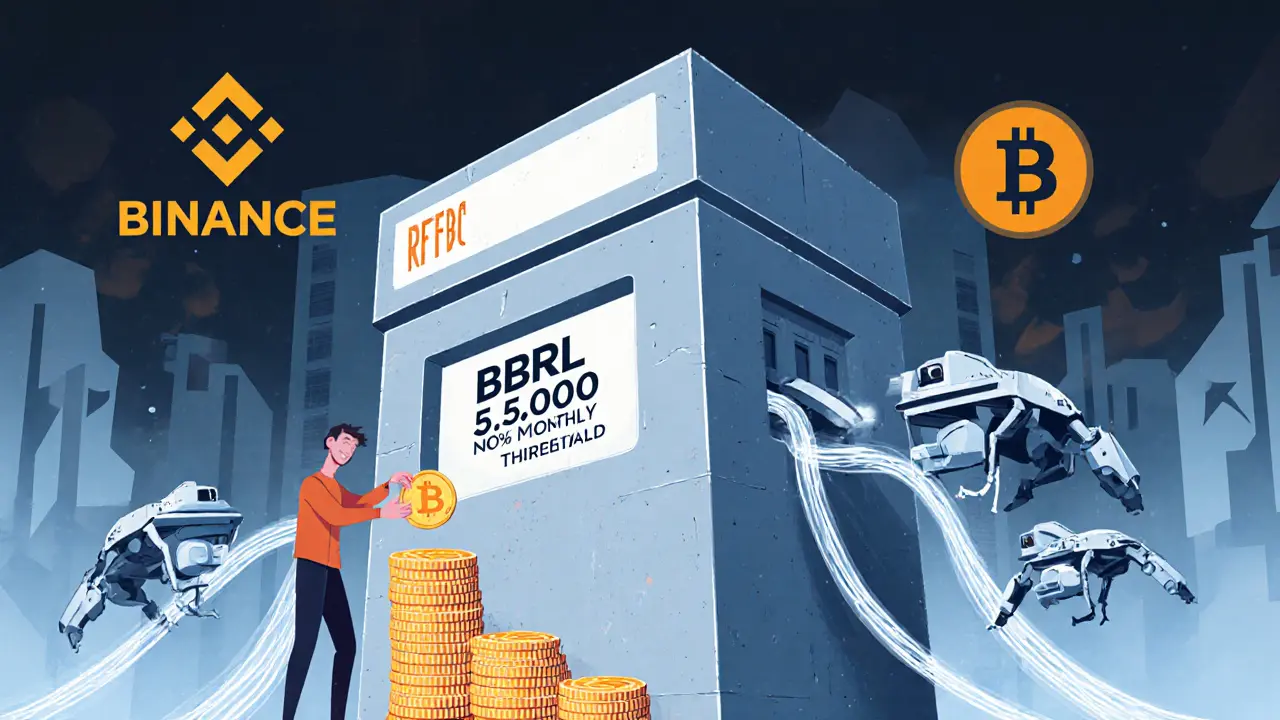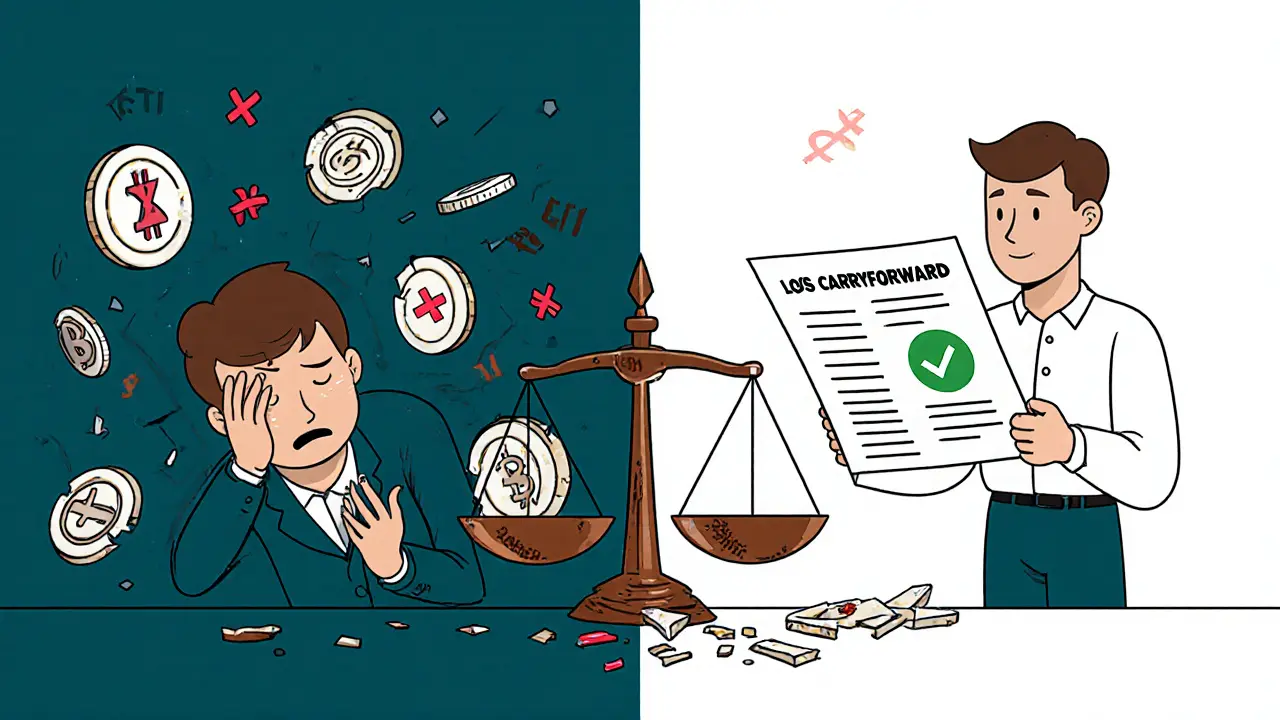Brazilian Cryptocurrency Tax Treatment: 17.5% Flat Rate on Gains Explained
 Oct, 12 2025
Oct, 12 2025
Brazilian Crypto Tax Calculator
Calculate Your Crypto Tax Liability
This tool calculates the 17.5% capital gains tax on your cryptocurrency transactions in Brazil according to the new tax regulations effective June 12, 2025.
Enter values to calculate your tax liability
Monthly reporting is required for transactions exceeding BRL 5,000 in value.
Since June 12, 2025, every crypto trade in Brazil - whether it’s swapping Bitcoin for Ethereum, selling Litecoin for reais, or earning staking rewards - is subject to a 17.5% flat capital gains tax. There are no exemptions. No exceptions for small trades. No grace period for long-term holders. This isn’t a tweak. It’s a total overhaul.
What’s Actually Taxed Now?
The Receita Federal do Brasil (RFB) doesn’t care if you held your crypto for two days or two years. If you made a profit, you pay 17.5%. That includes:- Selling crypto for Brazilian reais (BRL)
- Trading one cryptocurrency for another (BTC to ETH, for example)
- Earning staking rewards or mining income
- Receiving crypto as payment for goods or services
- Any DeFi activity that results in a gain
You don’t need to sell to trigger tax - swapping one coin for another counts as a taxable event. If you bought 0.1 BTC for BRL 5,000 and later traded it for 3.5 ETH worth BRL 7,500, you owe tax on the BRL 2,500 profit. That’s BRL 437.50, no matter how long you held it.
Reporting Rules: No More Guesswork
If your monthly crypto activity exceeds BRL 5,000 in value, you must report it. That’s not annual. That’s each month. So if you trade BRL 6,000 in January, BRL 4,000 in February, and BRL 7,000 in March - you report January and March. February doesn’t trigger reporting, but any profit from February still counts toward your annual tax bill.All reporting happens through the eCac portal. You need to file by April 30 of the following year. For the 2025 tax year, that deadline was April 30, 2026. Missing it means fines up to 20% of the unpaid tax, plus interest. And the RFB isn’t bluffing - they’re cross-referencing data from major exchanges like Binance, Kraken, and Mercado Bitcoin. If your wallet activity doesn’t match your declaration, you’ll get flagged.
Why 17.5%? And Why Now?
Brazil’s crypto market exploded in 2024. Between January and September, transaction volumes hit $43.5 billion - up 24.2% from the year before. The government saw a revenue stream it couldn’t ignore. Before 2025, small traders often avoided taxes because reporting was messy and enforcement was weak. Now, there’s no loophole.The 17.5% rate isn’t random. It’s a middle ground. Portugal taxes short-term crypto gains at 28%. Germany lets you avoid tax if you hold for over a year. The UK gives you a £3,000 allowance. Brazil chose to eliminate all those exceptions and go flat. Simpler for the government. Simpler for enforcement. But harder for everyday traders.

Who’s Getting Hit the Hardest?
Retail investors are feeling the squeeze. Many used to trade small amounts - buying $20 of Dogecoin here, selling $50 of Shiba Inu there - without thinking about taxes. Now, even those small trades add up. If you make five trades a month totaling BRL 6,000, you’re reporting every one. Tracking cost basis across multiple wallets and exchanges? That’s a full-time job.Professional traders and institutions see it differently. A flat rate means predictable costs. No need to calculate holding periods or worry about tiered brackets. For them, clarity is valuable. That’s why platforms like Koinly and Kraken rushed to build tools for Brazilian users. But for someone trading crypto on the side to cover rent? It’s a burden.
What About Losses?
You can offset losses against gains. If you lost BRL 10,000 on Solana but gained BRL 15,000 on Bitcoin, you only pay tax on the BRL 5,000 net profit. But here’s the catch: you can’t carry losses forward to future years. If you lost money in 2025 and made nothing in 2026, you lose that deduction. It’s a one-time use only.How Does This Compare to the Rest of the World?
| Country | Tax Rate | Exemptions | Holding Period Rules |
|---|---|---|---|
| Brazil | 17.5% flat | None | None - all gains taxed equally |
| Portugal | 28% (short-term) | Long-term (1+ year) exempt | Yes - holds matter |
| Germany | 0% after 1 year | €600 annual exemption | Yes - 1-year hold required |
| United Kingdom | 10-20% (income tax rates) | £3,000 annual allowance | No - but allowance applies |
| United States | 10-37% (income tax rates) | $0 - but long-term rates apply | Yes - 1-year hold for lower rate |
Brazil’s system is among the most straightforward - and the most restrictive. No allowances. No grace periods. No mercy for beginners. It’s designed for efficiency, not leniency.

What You Need to Do Right Now
If you traded crypto in Brazil in 2025, here’s your checklist:- Gather all transaction records from every exchange and wallet you used - including DeFi platforms.
- Calculate your cost basis for each asset. Use FIFO (first-in, first-out) unless you’ve documented another method.
- Track every trade, swap, staking reward, and airdrop.
- Use a crypto tax tool like Koinly, CoinTracker, or ZenLedger - they now support Brazilian RFB requirements.
- File your declaration through eCac by April 30, 2026, for the 2025 tax year.
Don’t wait. The RFB has automated systems that flag mismatches. If your exchange reports $12,000 in sales and you only declared $5,000, you’re on the radar.
What’s Next for Brazil?
The government isn’t stopping here. Alongside the new tax, Brazil’s Central Bank is testing Drex - a digital version of the real. It’s not crypto. It’s a state-controlled CBDC. The message is clear: if you’re going to use digital assets, they’ll be tracked, taxed, and regulated. Private crypto isn’t banned - but it’s no longer a gray area.Other Latin American countries are watching. Argentina and Colombia have signaled they may follow Brazil’s lead. If they do, the region could become the first to standardize crypto taxation - and set a global precedent for how emerging markets handle digital asset revenue.
Is This Fair?
Critics say it’s punitive. They argue it pushes small investors out of the market. Supporters say it’s fair - crypto isn’t magic money. It’s income. If you profit, you pay. The government’s stance is simple: if you can trade it, you can tax it.The truth? It’s neither fair nor unfair. It’s policy. And in Brazil, crypto is now part of the formal economy. You don’t get to opt out. You don’t get to ignore it. You pay your share - or you risk penalties that could cost you more than the tax itself.
Do I have to pay tax on crypto I bought before June 2025?
Yes. The 17.5% tax applies to all capital gains realized after June 12, 2025 - regardless of when you bought the asset. If you sold Bitcoin you bought in 2020 and made a profit in July 2025, you owe tax on that gain. The purchase date only matters for calculating your cost basis, not for exemption.
What if I lost money on crypto in 2025?
You can offset your losses against any gains you made in the same year. For example, if you lost BRL 8,000 on Ethereum but gained BRL 12,000 on Bitcoin, you only pay tax on the BRL 4,000 net profit. But you cannot carry forward unused losses to future years. They expire at the end of the tax year.
Do I need to report crypto I’m holding but didn’t sell?
No. You only report transactions that resulted in a gain or loss - like selling, swapping, or earning rewards. Holding crypto without trading doesn’t trigger a tax event. But if your monthly trading activity exceeds BRL 5,000, you must report all transactions for that month, even if some didn’t result in profit.
Can I use a crypto tax app to file automatically?
Yes. Platforms like Koinly, CoinTracker, and ZenLedger now offer direct export formats compatible with Brazil’s eCac portal. These tools import your transaction history from exchanges, calculate gains and losses, and generate the correct RFB-formatted report. Many Brazilian users rely on them to avoid errors.
What happens if I don’t report my crypto gains?
The RFB cross-checks data from exchanges and financial institutions. If your reported gains don’t match their records, you’ll receive a notice. Penalties include 20% of the unpaid tax, plus monthly interest (Selic rate), and potential fines for intentional omission. In severe cases, the tax authority can freeze bank accounts or initiate criminal proceedings for tax evasion.
Are NFTs taxed the same way?
Yes. NFTs are treated as digital assets under Brazilian law. Selling an NFT for crypto or reais, or swapping one NFT for another, triggers a taxable event. The same 17.5% rate applies to any profit. Cost basis is calculated based on what you paid for the NFT, including gas fees and marketplace fees.
Do I need to report crypto received as a gift?
Receiving crypto as a gift is not taxable. But if you later sell or trade it, the original cost basis becomes your responsibility. If the donor can’t provide it, you may need to estimate it based on market value at the time you received it. Failing to report gains from gifted crypto can lead to penalties.